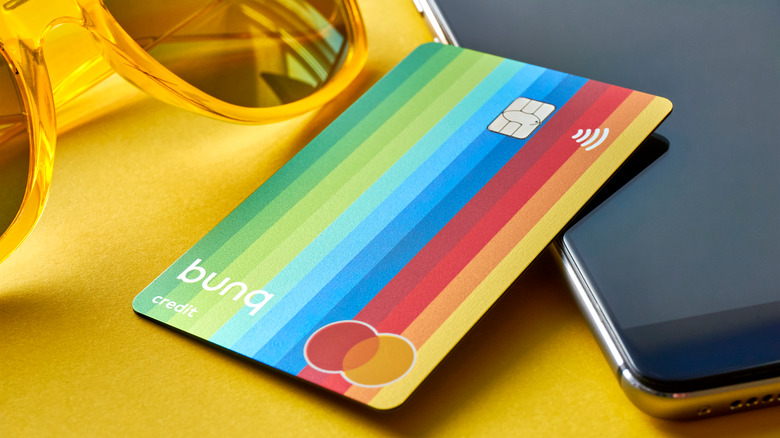This Kind Of Card Will Cost You While Traveling, According To Rick Steves
There are a LOT of different things to take into consideration when traveling or planning to travel. From logistical things like transportation, flights, and accommodations (all of which cost more than they did last year, according to NerdWallet's Travel Price Index) to knowing where the best place to exchange your currency is, travel planning can be exhausting. Plus, with increased rates of credit card fraud and identity theft, security concerns can add a whole new level of complication to your travel planning. This is why some travelers might decide to simplify some of their financial concerns by using a prepaid travel card instead of their regular credit or debit card.
Prepaid travel cards allow users to load whatever amount they want onto a card that can then be used at their destination (wherever cards like Mastercard or Visa are accepted, that is). The cards essentially allow you to access the cash you loaded onto the card in whatever the local currency is at your travel destination, without the risk of having to use your debit card. While these cards can sound like a good idea, and a solid way to simplify some travel planning, there can be some serious downsides to consider when using these kinds of travel cards. As Rick Steves, travel writer, author, and self-proclaimed leading authority on European travel, explained on his website, consumers really shouldn't bother with prepaid travel cards. Let's dive into the downsides of prepaid cards, and some alternatives you should consider when traveling abroad.
Downsides to prepaid travel cards
While, on the surface, prepaid travel cards offer additional protections like limited fund loss in the event the card is stolen (since the thieves would only have access to whatever amount was pre-loaded onto the card as opposed to your entire bank account or credit limit with a debit or credit card), the downsides don't necessarily make them worth it. In fact, Rick Steves points to the high associated fees that generally come with prepaid travel cards as the primary reason that they aren't worth it for most travelers.
Credit card companies can levy a fee between 1%-3% of every transaction you make for something known as foreign transaction fees. Not to mention your issuing bank will probably also charge around 1% of your transaction total in currency conversion fees on every transaction you make. While that might not sound like much, it can add up, and fast, while traveling.
It's also important to realize that, depending on the kind of prepaid travel card you might decide to use, you could face fees for everything from activation fees to monthly fees to balance inquiry fees. All of these different fees can and do add up to make whatever amount you initially loaded onto your selected card not go as far as you might have hoped. While this can be problematic under normal circumstances, it can be especially difficult while traveling abroad with a set budget or pre-loaded financial amount. You could instead find yourself running out money before the end of your trip.
Prepaid travel card alternatives
Perhaps the best solution for travelers who regularly visit foreign countries is to find a credit card that offers no foreign transaction fees. While that might not be the most attractive perk when shopping for a credit card, it could end up saving you a decent amount of money in the long run. Rick Steves offered his preferred strategy for handling your money while traveling abroad: "Pay for most items with cash (use a bank that charges low rates for international ATM transactions, and withdraw large amounts at each transaction — keeping the cash safe in your money belt)." While we believe some things should never be paid for in cash, it can be helpful in some geographic destinations to rely more heavily on cash when trying to avoid pesky fees. However, we still advise you to proceed with caution when it comes to that strategy.
Steves also offered a helpful tip when it comes to getting the most out of your low or no foreign transaction fee card: "Make sure your transactions are charged in the local currency — not dollars." This allows the conversion rate to be handled by your credit card company directly rather than the potential for something known as dynamic currency conversion, or DCC. DCC converts currency at the point of sale, but it has been found to have extensive markups on its currency exchange rates and fees, sometimes even charging as much as 12% higher for consumers, according to a report from the European Consumer Organisation.


